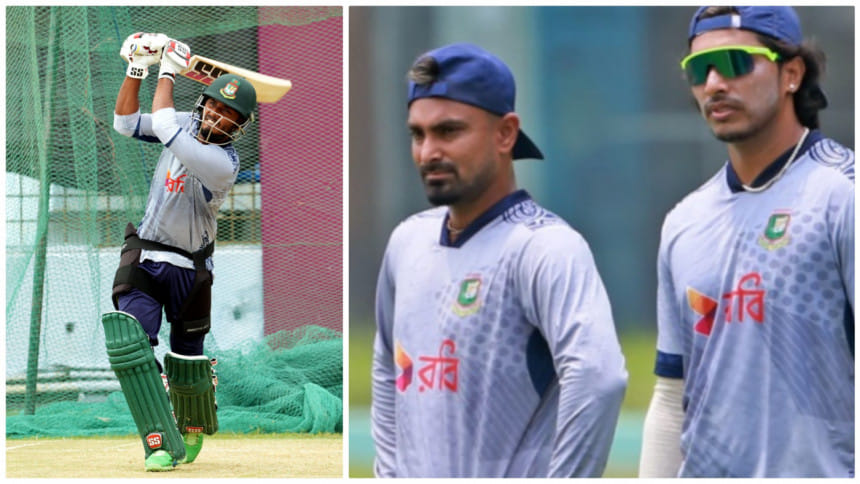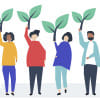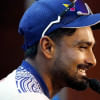Slow coaches at top an impending problem for Tigers

A show of 'Power' had been missing in 'Powerplays' for Bangladesh in the past editions of the T20 World Cups, as batters have more often than not failed to make use of the field restrictions in the first six overs -- a handicap that has hindered the team's fortunes in the competition.
In the last five editions of the T20 World Cup, the average strike rate of Bangladeshi batters in the Powerplay was 98.33, which means the team has struggled to put 36 runs on the board in the first six overs.
In the 2021 edition in the UAE, for example, Bangladesh's Powerplay run-rate was below six in six out of their eight matches.
Bangladesh's Powerplay strike rate in T20 World Cups since 2012 is the second lowest amongst all Test-playing nations, with Zimbabwe (91.08), who were not part of the 2021 edition and could not qualify for the upcoming edition, occupying the bottom spot.
England, two-time winners, are topping this chart with a Powerplay strike rate of 121.80. West Indies, one of the hosts of the upcoming edition, are near the bottom of this list with a strike rate of 103.53.
However, with their barrage of big hitters lower down the order, two-time champions West Indies can afford to start slow; Bangladesh do not have the same luxury.
The forthcoming edition might not be a run-fest, with pitches expected to provide something for the bowlers as well.
Still, if Bangladesh are to do well, their top order, especially the openers, have to strike the balance between caution and aggression from the start and try not to throw away their wickets while latching onto every opportunity to hit a boundary.
The Tigers have picked three openers for this edition -- two experienced ones with questionable form and one in-form youngster who hasn't been tested against the best in the format.
Liton Das, the only right-hander of the three, will be playing in his third edition this time and averages exactly 20 in 13 innings in T20 World Cups at a strike rate of a shade above 113.
The wicketkeeper-batter hit his lone half-century in the tournament in the last edition, a swashbuckling 60 off 27 balls against India that almost took Bangladesh home in a rain-hit affair.
But this time around, the right-hander is not a sure starter in the eleven as his form is at an all-time low, with his strike rate being below 98 in T20Is so far this year at an average of 13.16.
Still, the selectors kept faith in the experienced batter and coach Chandika Hathurusingha said he is expecting 'big things' from him in the World Cup in a video posted by Bangladesh Cricket Board (BCB) on social media yesterday.
Soumya Sarkar is the most experienced opener in the side in terms of T20 World Cup appearances, having featured in the last three editions and playing 15 matches.
However, his underwhelming strike rate of exactly 100 and paltry average of 13.06 indicate that the left-hander has never quite played to his potential in the tournament.
"I think he has underperformed so far. We have seen glimpses of his best from time to time… When he is at his best, he is a match-winner. I hope he will win a couple of games for us," Hathurisingha said in the same video.
Tanzid Tamim, the youngest of the three, has just five T20Is under his belt, all of which were against Zimbabwe in the recently-concluded series. He finished as the highest run-getter in the series with 160 and looked in much better touch than Liton and Soumya.
If Tanzid opens with Soumya, as they did in the final two T20Is against Zimbabwe, then Bangladesh are likely to send right-hander Towhid Hridoy at No. 3 and push back skipper Najmul Hossain Shanto at No. 4.
While Hridoy has looked in form, albeit a tad inconsistent, Shanto was seen struggling to get a score against Zimbabwe.
The experienced top-order batters not being in form is not a good sign for Bangladesh, but perhaps, there is a risky solution in sight.
Shakib Al Hasan excelled at No. 3 in the latter half of the last BPL, and sending him up the order in that free-flowing role could solve Bangladesh's Powerplay woes, something Shanto said he was open to doing in the final press conference before the team left for the USA.
Given the team's dire straits at the top, perhaps it is time for the management to think out of the box and try something unconventional to jumpstart the proceedings.
Team Powerplay strike rates in last five T20 World Cups
England: 121.80
South Africa: 119.62
Australia: 118.89
Ireland: 116.63
New Zealand: 112.11
Sri Lanka: 111.65
India: 110.39
Afghanistan: 106.22
West Indies: 103.53
Pakistan: 103.41
Bangladesh: 98.33
Zimbabwe: 91.08

 For all latest news, follow The Daily Star's Google News channel.
For all latest news, follow The Daily Star's Google News channel. 










Comments